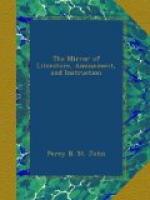Cobbett’s English Gardener.
* * * * *
SIR W. TEMPLE’S GARDEN.
It was formerly the fashion to have a sort of canal, with broad grass walks on the sides, and with the water coming up to within a few inches of the closely shaven grass; and certainly few things were more beautiful than these. Sir William Temple had one of his own constructing in his gardens at Moor Park. On the outsides of the grass-walks were borders of beautiful flowers. I have stood for hours to look at this canal, which the good-natured manners of those days had led the proprietor to make an opening in the outer wall in order that his neighbours might enjoy the sight as well as himself; I have stood for hours, when a little boy, looking at this object; I have travelled far since, and have seen a great deal; but I have never seen any thing of the gardening kind so beautiful in the whole course of my life—Ibid.
* * * * *
BULBOUS ROOTS.
In glasses filled with water, bulbous roots, such as the hyacinth, narcissus, and jonquil, are blown. The time to put them in is from September to November, and the earliest ones will begin blowing about Christmas. The glasses should be blue, as that colour best suits the roots; put water enough in to cover the bulb one-third of the way up, less rather than more; let the water be soft, change it once a week, and put in a pinch of salt every time you change it. Keep the glasses in a place moderately warm, and near to the light. A parlour window is a very common place for them, but is often too warm, and brings on the plants too early, and causes them to be weakly.—Ibid.
* * * * *
TRAVELLING INVALIDS.
We cannot refrain from stating our belief, and this on the authority of intelligent physicians, as well as from personal observation, that much mischief is done by committing invalids to long and precarious journeys, for the sake of doubtful benefits. We have ourselves seen consumptive patients hurried along, through all the discomforts of bad roads, bad inns, and indifferent diet, to places, where certain partial advantages of climate poorly compensated for the loss of the many benefits which home and domestic care can best afford. We have seen such invalids lodged in cold, half-furnished houses, and shivering under blasts of wind from the Alps or Apennines, who might more happily have been sheltered in the vales of Somerset or Devon. On this topic, however, we refrain from saying more—further than to state our belief, that much misapprehension generally prevails, as to the comparative healthiness of England, and other parts of Europe. Certain phrases respecting climate have obtained fashionable currency amongst us, which greatly mislead the judgment as to facts. The accurate statistical tables, now extended to the greater part of Europe, furnish more secure grounds of opinion; and from these we derive the knowledge, that there is no one country in Europe where the average proportion of mortality is so small as in England. Some few details on this subject we subjoin,—tempted to do so by the common errors prevailing in relation to it.




